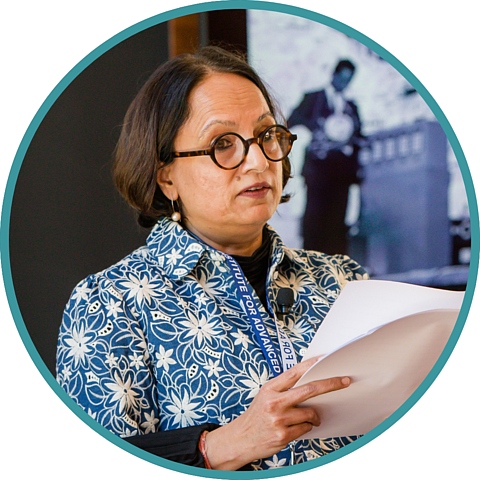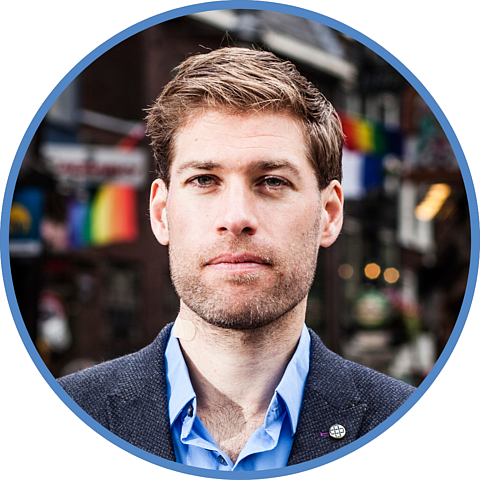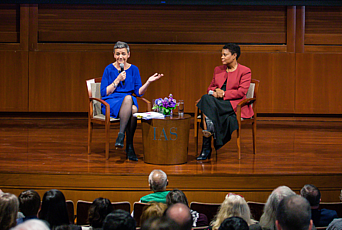During the 2023–24 academic year, the School of Social Science hosted a special theme year titled PLATFORM. The theme year was convened by Alondra Nelson, Harold F. Linder Professor in the School, alongside Visiting Professors Lisa Nakamura and Christian Sandvig from the University of Michigan. To offer a view into their work, some of the theme year participants share thoughts on what the word "platform" means in their work and how "platform" serves as a useful concept in their research.

"Ahoy platforms ahead!
Always hungry, ever-watching
‘Til death do us part."
"Uber. TaskRabbit. DoorDash. In less than a decade, digital platforms have made the gig economy a household word and gig work a popular form of employment. In my research, I am interested in the intersection of work and digital platforms. How have they helped create a world of work that is both profoundly enthralling and deeply exploitative? Why does your Uber driver drive? No, it’s not (only) because they want to save up money for their next vacation or to pay the water bill. It’s because of empowering cultural narratives calling them entrepreneurs and heroes and the alluring features on the platform’s app that enable work to become a ‘game’ in which the odds are always in the platform’s favor. Try this: the next time you’re in a ride-hailing car, don’t ask the driver about their day, instead, ask them if they are winning the game. Hint: you already know the answer."
Lindsey D. Cameron
Member

"The new identification infrastructure Aadhaar (a de facto mandatory biometrics identification system for every Indian citizen and resident) displays all characteristics of platforms: scale, ubiquity, dependency.
Its adoption has catapulted the Indian state into a new era. India is currently in the process of creating an extant digital public infrastructure that is enabled by Aadhaar, and not yet seen at this scale anywhere else in the world, at least for the moment. Aadhaar and other constituent technologies of this infrastructure are already being exported to several governments across the globe, as well as being championed by institutions like the World Bank.
What is unfolding in and through this infrastructure and the vision behind its creation are both new. The concept of platform has allowed me to become attuned to this next generation of the state-making in altogether new ways and ask a new question: if commercial platforms, such as Amazon and Uber, ushered in a new kind of capitalism, what does the platformization of governance do to state-making and sovereignty?"
Kriti Kapila
Member

"I am not so much interested in platforms, but in those who have to live with them. It is comparatively easy to think of platforms in terms of business models, technologies, markets, public policies, or forms of capitalism. It is much harder to unpack the work that ordinary people have to do to cope with, understand, and challenge platforms on a daily basis. Take a service like Google Search and its ranking of web pages. For scholars, engineers, and politicians, this may be a problem of monopoly and bias. For yoga mat resellers, anti-fracking activists, and local politicians, it is a battleground on which they have to compete for visibility day in and day out. Now, when you do this kind of empirically grounded research something fascinating happens. The ‘platform’ tends to disappear and becomes just another aspect of a person’s life—yet at the same it is always there. It is this tension that makes the concept both so useful and so problematic.”
Malte Ziewitz
Member

"In my work, the notion of platform is not peripheral—it means everything. That is, it sits at the very core of an emerging field of study referred to as platform studies. Situated across the disciplines of media, communications, and economics, we are concerned with the process of platformization. Or, how companies and entrepreneurs (e.g., journalists, game developers, or creators) become dependent on platform companies, such as Facebook, Google, ByteDance, and Tencent. For us, ‘platform’ is not a metaphor, but marks a specific political economic arrangement that is conceptually and empirically bounded. For example, not all technology companies are necessarily platform companies, nor does digitization equal platformization. Instead, platform companies give way to platform markets and platform infrastructures, which in turn, are subject to platform governance frameworks. These arrangements, in turn, impact platform labor (those working with and for platforms), creativity (content distributed via platforms), and therefore, ultimately, democracy. After all, many platform companies have morphed into transnationally operating conglomerates, which have become dominant corporate actors. An endless slew of high-profile lawsuits aimed against the abuse of corporate power attests to the urgency of this research agenda."
David B. Nieborg
Member

"In relation to global health, the notion of the platform offers an alternative to the field’s commodity fetishism: the idea that contextual problems of disease burden can be addressed, at least temporarily, by the ‘delivery,’ ‘roll out,’ or ‘scaling up’ of singular, standardized objects. Platform technologies—e.g., rapid diagnostics, vaccine vectors, microbiota delivery system—in contrast, extend programs of action through an iterative enrollment of local users, working less as 'magic bullets’ and ‘band-aids’ than as technical stacks, bioengineered back-bones or building blocks. The generative nature of platform-technologies to amplify and animate public health capabilities is contingent upon the specific socio-material, political, and institutional contexts of use. Straddling prevailing logics of market failure and the neophilia of humanitarian innovation, platform technologies anticipate a global health future freed from the vicissitudes of philanthropic sentiment and corporate social responsibility. A platform’s global health value could ultimately be infrastructural, measured not merely in ‘lives saved’ but in infrastructures extended and public assets generated. This is, at least, the promise. The specific political affordances of platforms, their ability to shift the horizon of technological progress towards either public agency or corporate capture remains a matter for empirical investigation, demanding historically grounded, ethnographically informed analysis of the new sets of actors and spatial-technical arrangements that platform technologies catalyze and, with any luck, may ultimately give way to more radically democratic public health projects."
Ann Kelly
Member

"My current research focuses on one of the most heavily consumed and highly contested forms of media: pornography. As an ethnographer of cultural fields, I spent the previous two years immersed in the Los Angeles pornography industry, attending trade conventions and award shows, observing an array of pornography shoots, and interviewing industry members, including male and female performers, directors, agents, and corporate actors. At IAS, I am writing a book on how performers produce pornography through their daily work. I argue that academics, activists, policymakers, and the general public must ground their views of pornography not on preconceived ideology but on how performers themselves interact with each other and understand their work. Rather than seeking a sterile work environment, performers try to coproduce varying degrees of emotional intimacy—ranging from friendly rapport to sexual chemistry and attraction—throughout the workday.
Digital platforms have profound consequences for how performers interact with each other in this process. Pornography is distributed and consumed via an array of digital platforms, including studio-based websites, 'tube sites' (i.e., Pornhub), and subscription-based platforms (i.e., OnlyFans). Performers simultaneously arrange their own shoots with other performers for OnlyFans and get bookings through their agents to produce scenes for studio-based websites. OnlyFans and similar subscription-based platforms offer performers more autonomy, while also introducing additional layers of interactional complexity, as performers’ daily workplaces shift back and forth from their bedrooms to more formal studio sets. Understanding how platforms structure performers’ interactions helps reveal the ways in which intimacy can both make work meaningful and go dangerously wrong."
Hannah Wohl
AMIAS Member

"In a well-known paper published in 1989, sociologist Susan Leigh Star and philosopher James Griesemer coined the term ‘boundary objects.’ They defined them as ‘objects which are both plastic enough to adapt to local needs and constraints of the several parties employing them, yet robust enough to maintain a common identity across sites.’ In my work, I treat the notion of platform as a boundary object: technologies such as social media apps and global messaging systems that are used variously by different actors in divergent contexts, but which have a series of shared traits, such as digitality and interconnectivity among others, that facilitate being identified as a distinct conceptual entity. In light of the diversity of digital culture, this boundary object quality of platforms makes them a generative notion to think-with, as psychologist Sherry Turkle put it."
Pablo Boczkowski
Member



